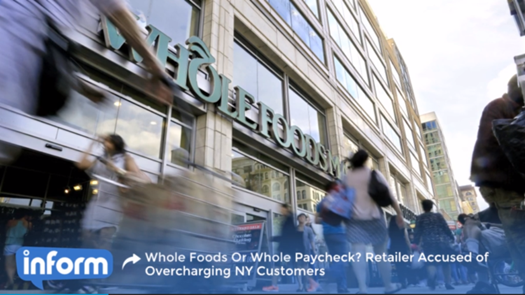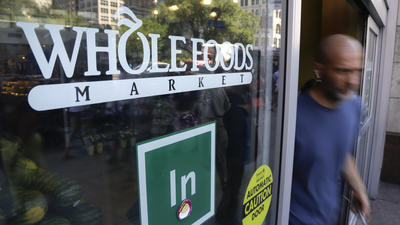Whole Foods to pay $500,000 for overcharging NYC customers
Whole Foods to pay $500,000 for overcharging NYC customers
Whole Foods and New York City’s Department of Consumer Affairs (DCA) have announced that the grocery will settle with the city for $500,000 for overcharging customers.
(Judy Lowery / Daily Press)
Justin Wm. MoyerThe Washington Post
It was the story that, over the summer, ushered in a season of discontent with the grocery store chain nicknamed by its critics "Whole Paycheck": the accusation that Whole Foods had overcharged some New York customers for, among other items, produce and pre-packaged fresh products.
Apologizing – and blaming its employees – Whole Foods quickly retreated.
"Straight up, we made some mistakes," co-CEO Walter Robb said in an online video that introduced a price-auditing system. "We want to own that and tell you what we’re doing about it."
But the saga did not end there. Now, Whole Foods and New York City’s Department of Consumer Affairs (DCA) have announced that the grocery will settle with the city for $500,000 – but issued dueling press releases over what the settlement meant for consumers.
Upmarket US grocery chain Whole Foods has been accused in New York of routinely overcharging customers.
"After discovering the troubling and repeated mislabeling of pre-packaged goods at Whole Foods last year, we are happy to have reached an agreement with Whole Foods that will help to ensure New Yorkers are better protected from overcharging," DCA Commissioner Julie Menin said in a statement. "Whether it’s a bodega in the Bronx or a national grocery store in Manhattan, we believe every business needs to treat its customers fairly and, with this agreement, we hope Whole Foods will deliver on its promise to its customers to correct their mistakes. DCA will also continue its vigilance in making sure New Yorkers are protected every time they check out at the grocery."
As explained by the DCA, the agreement forces Whole Foods to:
– pay $500,000;
– conduct quarterly in-store audits of at least 50 products from 10 different departments at all New York City stores to help ensure products are accurately weighed and labeled, and to correct all inaccuracies;
– in the event that DCA inspectors identify mislabeled pre-packaged foods at a Whole Foods Store, that store must immediately remove all mislabeled products and, within 15 days, Whole Foods must check the accuracy of that product’s pricing, as well as 20 additional products from the same department, at all New York City stores;
– implement and enforce policies and procedures that require employees not estimate the weight of a package but rather individually weigh each package and only label the package with a label that is based on the weight of the actual contents; and,
– conduct trainings for all New York City employees who are involved in weighing and labeling products.
Whole Foods, however, was less sanguine about the agreement, saying it is only paying to move on.
"While WFM refused to consider the DCA’s initial demands of $1.5 million, we agreed to $500,000 in order to put this issue behind us so that we can continue to focus our attention on providing our New York City customers with the highest level of quality and service," the company said in a statement.
Whole Foods also criticized the auditing system the agreement outlined.
"Unfortunately the DCA has misrepresented this agreement," the company said. "WFM has had in place preexisting pricing and weights/measures programs including a third party auditing and training program and a 100 percent pricing accuracy guarantee that gives customers a full refund on any item inadvertently mispriced. These are pre-existing programs that go above and beyond the DCA’s requirements. Furthermore, the DCA’s allegations of violations on weighted/measured items were limited to New York City, and as our joint agreement states, there was no evidence of systematic or intentional misconduct by anyone in the Northeast region or the rest of the company."
Whole Foods to stop selling products made by prisoners
The agreement caps off a tough year for Whole Foods. The company didn’t just see dwindling revenues and the price of its stock halved. It also faced criticism over $6 asparagus water and hard questions about whether its animal welfare rating system is meaningless. One investigation by animal activists even alleged its Thanksgiving turkeys endure "horrific conditions."
Earlier this month, CNN Money wondered whether Whole Foods – a leader in the organic grocery revolution and a mainstay in gentrifying cities around the country – might not be targeted for a buyout.
"Some traders think the company might be looking to sell out so it no longer has to deal with Wall Street," Paul R. La Monica wrote. ". . . There’s little doubt that Whole Foods . . . would also be better off if it didn’t have to worry about meeting quarterly earnings and sales targets."
Copyright © 2015, Chicago Tribune


